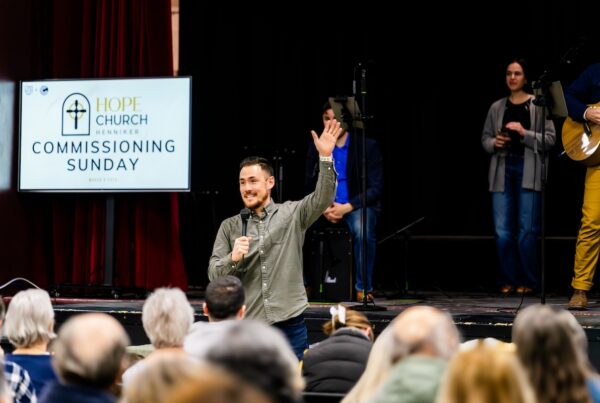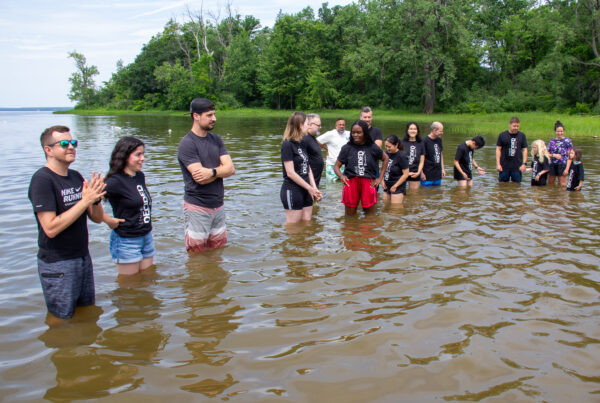“It’s easier to teach a wooden spoon to play the piano than it is to teach Ben another language.” A bit of Yorkshire humour from my best man’s speech at my wedding 18 years ago. He wasn’t wrong. My sheer incompetence at learning any new language is epic.
In school, I was so desperate to quit French that I opted to take two sciences instead—which I was only slightly better at. Plus, don’t get me started on grammar. I still get confused between verbs, adjectives, and those other ones.
God really works in mysterious ways. Despite my linguistic challenges, he gave me—a Brit—a Swedish wife and a heart to reach the Swedish people. From my first trip to Sweden, it was apparent there was a desperate spiritual need here. Its rich evangelical heritage had been decimated by comfort, secularism, individualism, and progressive Christianity.
Sweden needs Jesus. They need to hear the good news that Jesus saves sinners, and they need to hear it in their own language. Swedes speak great English. However, English preachers mainly attract internationals, not Swedes. So If I want to reach Swedes, I must teach in Swedish.
Preaching in a Second Language
We arrived in Sweden in January 2020 and in September, I gave my first exposition in dodgy Swedish to a small crowd. It was painful, but we survived. Two years later, it’s gotten better and I’m now giving weekly, mini-expositions in our house and preaching regularly in different churches. How awful would it have been to plant a church in my own strength, only to stand before my king one day and discover I preached for my glory, not his? Klick um zu Tweeten
But it’s still my greatest weakness. Preaching feels like flying, but in Swedish, it feels like falling backward down the stairs. Thankfully, it doesn’t feel that way for those listening. It’s in our weaknesses that God shows his sovereignty and grace. Whether our sermon illustrations fall flat, we can’t stay within the time limit, or we stumble through a second language, it’s still God’s will to save his people. And he still works through humble preachers.
Doing ministry in a second language is a constantly humbling process and I’ve learned a lot. Let me share two lessons with you for your encouragement.
1. When I’m weak, I’m strong.
Am I the only church planter who wished they could preach like Matt Chandler? It’s an ugly ambition for a pastor, isn’t it? We need to slay pride whenever we see it and God has slain it in me. I was a confident preacher and felt at home in the pulpit—maybe a little too at home. God, in his loving mercy, took away my confidence in preaching by making it highlight my greatest weakness. I’m deeply grateful for this.
How awful would it have been to plant a church in my own strength, only to stand before my king one day and discover I preached for my glory, not his? When God takes away what we love, he does it for our good.
As I preach, often in poor Swedish, God still works through my broken words to change lives. God may use our strengths but he shines brightest through our weaknesses. Many times, I prayed, Lord, give me the gift of being fluent in Swedish, and he said, “My grace is sufficient for you, for my power is made perfect in weakness” (2 Cor. 12:9). Whether our sermon illustrations fall flat, we can’t stay within the time limit, or we stumble through a second language, it’s still God’s will to save his people. And he still works through humble preachers. Klick um zu Tweeten
2. It’s not about me.
I won’t ever be able to preach or teach as comfortably in Swedish as any of the Swedes on my launch team. So my goal is to make them better handlers and communicators of God’s Word for greater kingdom impact.
Church planting is a team sport. God has designed the church to be a community of people who all use the gifts he has given them to build one another up for his glory. Every member of the team is vital to the victory. Yet, it’s easy to treat church planting like a game of golf. We, the planters, are the most gifted ones, and we swing our clubs with excellence as our members watch and cheer us on from the sides. We can do this because we want the best for the church. After all, we have the most experience and training and we can do things better than anyone else, right? Church planting is a team sport. God has designed the church to be a community of people who all use the gifts he has given them to build one another up for his glory. Klick um zu Tweeten
What would our ministries be if Jesus treated us in that way? Yes, we can preach, but he is the great preacher! We can heal, but he is the great physician! There is nothing we can do that he can’t do infinitely better. And yet, knowing our weaknesses fully, he graciously calls us onto the field to play with him. Why? Because in his great plan, sharing the field gives him greater glory. Maybe the only way God could get me to see the importance of the other players was by making me play with a limp.
I say all of this as someone who has always had a vision for training others. Or at least I thought I did. But now, I see it as the only way forward. I realise this is always the way it should’ve been.
I may never be as comfortable a preacher in Swedish as I am in English, but by God’s grace, I’m a better preacher now. I smile knowing there must be a wooden spoon somewhere learning to play chopsticks.










